Assessment of the attack of Hyadaphis foeniculi (Passerini) (Hemiptera: Aphididae) on biomass, seed and oil in fennel intercroped with cotton with colored fibers.
Assessment of the attack of Hyadaphis foeniculi (Passerini) (Hemiptera: Aphididae) on biomass, seed and oil in fennel intercroped with cotton with colored fibers.
Summary: The fennel aphids, Hyadaphis foeniculi (Passerini) (Hemiptera: Aphididae) attack umbels and may thus,cause to failure of fruit setting and also attack during the phase of seed development. Our research investigated the severity of biomass, seed and essential oil damages related to infestation by the fennel aphid, H. foeniculi in fennel (Foeniculum vulgare Miller) plots and plots of fennel intercropped with cotton with colored fibers. A randomized complete block design was used with four treatments: (1) two rows offennel: three rows of cotton (2F: 3C) (non-treated plot), (2) two rows of fennel: three rows of cotton (2F:3C) (treated plot), (3) fennel (F) (non-treated plot), and (4) fennel (F) (treated-plot), with four replications.The average of the weight of fennel seeds from umbels in the green stage in treated plots (0.19 mg) washigher (21%) than in the non-treated plots (0.15 mg). There was no significant difference in the essential oilextracted from biomass between two cropping systems for both treated and non-treated plots. However,the amount of essential oil extracted from fennel biomass in treated plots was higher in fennel plots thanin fennel in non-treated plots. The average of the essential oil of 1000 fennel seeds from fennel-cotton intercropping system (0.17 ml) was higher (18%) than in the fennel cropping system (0.14 mg). The aphid attack reduced 29% of fennel seed weight. On the other hand, the average amount of essential oil extractedof the non-attacked seeds was two folds higher than of the attacked seeds. Therefore, our results showed that the effects of H. foeniculi on these yield components were smaller in the plots with fennel-cotton intercropping than in fennel plots. We suggest that seed composition responses to H. foeniculi injury should be an important consideration when conducting research to develop IPM systems for this fennel pest.
Publication year: 2015
Types of publication: Journal article
Unit: Embrapa Cotton
Observation
Some of Embrapa's publications are published as ePub files. To read them, use or download one of the following free software options to your computer or mobile device. Android: Google Play Books; IOS: iBooks; Windows and Linux: Calibre.
Access other publications
Access the Agricultural Research Database (BDPA) to consult Embrapa's full library collection and records.
Visit Embrapa Bookstore to purchase books and other publications sold by Embrapa.

